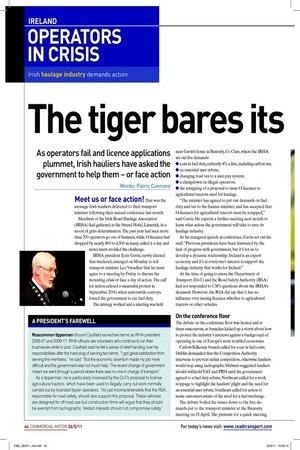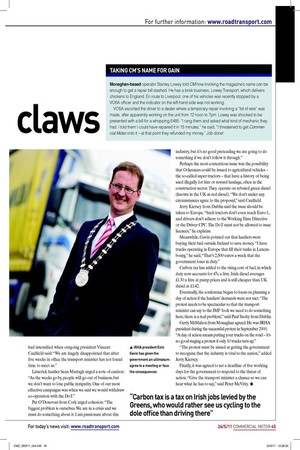The tiger bares its
Page 35

Page 36

If you've noticed an error in this article please click here to report it so we can fix it.
As operators fail and licence applications plummet, Irish hauliers have asked the government to help them – or face action
Words: Patric Cunnane Meet us or face action! That was the
message Irish hauliers delivered to their transport minister following their annual conference last month.
Members of the Irish Road Haulage Association (IRHA) had gathered at the Strand Hotel, Limerick, in a mood of grim determination. The past year had seen more than 200 operators go out of business, while O-licences had dropped by nearly 800 to 4,500 as many called it a day and newcomers avoided the challenge.
IRHA president Eoin Gavin, newly elected that weekend, emerged on Monday to tell transport minister Leo Varadkar that he must agree to a meeting by Friday to discuss the mounting crisis or face a day of action. The call for action echoed a successful protest in September 2000, when nationwide convoys forced the government to cut fuel duty.
The strategy worked and a meeting was held near Gavin’s home in Bunratty, Co Clare, where the IRHA set out ive demands: ● a cut in fuel duty, currently 47c a litre, including carbon tax; ● an essential user rebate; ● changing road tax to a user-pay system; ● a clampdown on illegal operators; ● the scrapping of a proposal to issue O-licences to agricultural tractors used for haulage.
“The minister has agreed to put our demands on fuel duty and tax to the inance minister, and has accepted that O-licences for agricultural tractors must be scrapped,” said Gavin. He expects a further meeting next month to learn what action the government will take to save its haulage industry.
At his inaugural speech at conference, Gavin set out his stall: “Previous presidents have been frustrated by the lack of progress with government, but it’s for us to develop a dynamic relationship. Ireland is an export economy and it’s in everyone’s interest to support the haulage industry that works for Ireland.”
At the time of going to press, the Department of Transport (DoT) and the Road Safety Authority (RSA) had not responded to CM’s questions about the IRHA’s demands. However, the RSA did say that it has no inluence over issuing licences, whether to agricultural tractors or other vehicles.
On the conference floor
The debate on the conference loor was heated and at times rancourous, as branches kicked up a storm about how to protect the industry’s interests against a background of operating in one of Europe’s most troubled economies.
Carlow/Kilkenny branch called for a cut in fuel costs; Dublin demanded that the Competition Authority intervene to prevent unfair competition, otherwise hauliers would stop using tachographs; Midwest suggested hauliers should withhold VAT and PRSI until the government agreed to a fuel duty rebate; Northeast called for a work stoppage to highlight the hauliers’ plight and the need for an essential user rebate; Southeast called for action to make customers aware of the need for a fuel surcharge.
The debate boiled the issues down to the ive demands put to the transport minister at the Bunratty meeting on 15 April. The pressure for a quick meeting had intensiied when outgoing president Vincent Caulield said: “We are hugely disappointed that after ive weeks in ofice the transport minister has not found time to meet us.” Limerick haulier Sean Murtagh urged a note of caution: “As the weeks go by, people will go out of business, but we don’t want to lose public sympathy. One of our most effective campaigns was when we said we would withdraw co-operation with the DoT.” Pat O’Donovan from Cork urged cohesion: “The biggest problem is ourselves. We are in a crisis and we must do something about it. I am passionate about this industry, but it’s no good pretending we are going to do something if we don’t follow it through.” Perhaps the most contentious issue was the possibility that O-licences could be issued to agricultural vehicles – the so-called super tractors – that have a history of being used illegally for hire or reward haulage, often in the construction sector. They operate on rebated green diesel (known in the UK as red diesel). “We don’t under any circumstances agree to the proposal,” said Caulield.
Jerry Kiersey from Dublin said the issue should be taken to Europe. “Such tractors don’t even reach Euro-1, and drivers don’t adhere to the Working Time Directive or the Driver CPC. The DoT must not be allowed to issue licences,” he explains.
Meanwhile, Gavin pointed out that hauliers were buying their fuel outside Ireland to save money. “I have trucks operating in Europe that ill their tanks in Luxembourg,” he said, “That’s 2,500 euros a week that the government loses in duty.” Carbon tax has added to the rising cost of fuel, in which duty now accounts for 47c a litre. Irish diesel averages £1.30 a litre at pump prices and is still cheaper than UK diesel at £1.42.
Eventually, the conference began to focus on planning a day of action if the hauliers’ demands were not met. “The protest needs to be spectacular so that the transport minister can say to the IMF ‘look we need to do something here; there is a real problem’,” said Paul Tuohy from Dublin.
Gerry McMahon from Monaghan agreed. He was IRHA president during the successful protest in September 2000. “A day of action means putting your trucks on the road – it’s no good staging a protest if only 10 trucks turn up.”
▲ IRHA president Eoin “The protest must be aimed at getting the government Gavin has given the to recognise that the industry is vital to the nation,” added government an ultimatum: Jerry Kiersey.
agree to a meeting or face Finally, it was agreed to set a deadline of ive working the consequences days for the government to respond to the threat of action. “Give the transport minister a chance so we can hear what he has to say,” said Peter McVitty. ■












































